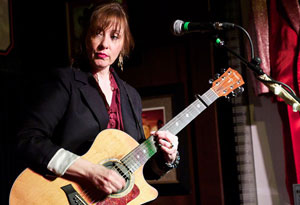Suzanne Vega's Aha! Moment

Photo: Getty Images
For much of her life, the singer-songwriter and star of the off-Broadway show Carson McCullers Talks About Love felt out of place—until a meeting with her biological father helped her discover where she belonged.
When I was 9, I found out that the man I called Daddy wasn't really my father. But he had raised me since I was 9 months old. I was embarrassed because this news meant I was different from my three younger siblings—or half-siblings. I was also shocked to learn I was white. My stepfather was Puerto Rican, and we had lived in Spanish Harlem for five years, immersed in the Latino culture. We children were raised to be proud of our heritage, but suddenly I didn't fit in anymore. I remember the summer I was 15, I toured New York City with a singing group from the Alliance of Latin Arts and I could almost hear the audience whispering, "What is she doing up there?"
By the time I was 28, music had become a way for me to connect with people. I worked really hard that year on my second album, Solitude Standing. When it became a big hit, I was thrown into the spotlight. All my dreams were coming true, so it seemed like a natural time to take a leap. I decided then to track down my father.
All I knew about him was that he had been adopted, was 19 when I was born, lived in California, and played the piano. With the help of a detective, I found his address and sent him a letter. I was so nervous—I had no idea if he'd want to hear from me. But he called just a week later, and I remember how his voice struck me: It was gentle, and his tone was somehow very familiar.
Three months later, I flew from New York to Los Angeles to meet him. I knew that my father was essentially a stranger, but he didn't seem like one. I looked at his eyes and hands, and recognized my own. There was this spiritual connection, too. It was as if I suddenly understood myself better. I thought, "Oh, so this is where I came from."
We spent the next three days catching up. He had reunited with his own biological family only two years before our meeting, and they had filled him in on our family tree. He shared with me everything he knew.
I found out that my grandmother was a drummer in an all-girl band, and my grandfather was a trumpet player; they had met on the road. As a kid, I hadn't known any professional musicians; I always thought that I was doing something new and atypical for my family. Then to find out I was descended from performers—it was a revelation!
Actually, most of my life, I hadn't considered myself a "real" musician because, for some reason, I had never been able to read music, though I'd tried many times to learn. I played guitar by ear and hired someone to write down the notes whenever I composed a piece. I was always insecure about that. But as my father and I talked, I learned that he couldn't read music either, and neither could my grandparents. Something clicked: My talent, and my flaws, were in my genes, passed down to me through at least two generations. Finally, I felt like I belonged.
More Musician Aha! Moments



